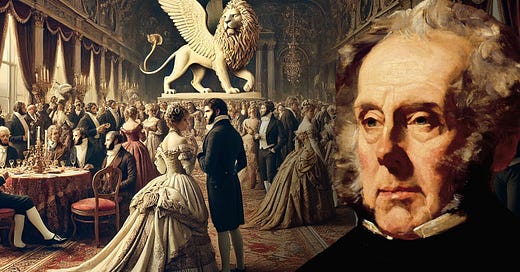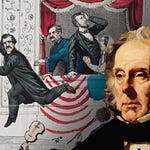Episode 03 - The Venetian Takeover of England: A 200-Year Project
Episode 05 - Bestial British Intelligence Of Shelburne and Bentham
Episode 07 - Palmerston Launches Young Turks to Permanently Control the Middle East
Episode 09 - Jim Crow, a Cultural Weapon in the Hands of the Confederacy
Venice influenced England’s political evolution over two centuries, establishing its oligarchical systems within England. This lecture focuses on key figures, events, and strategies by which Venice shaped England’s political, religious, and economic life from the era of Henry VIII to the rise of the British Empire. By tracing the influence of Venetian political strategy and philosophy, he suggests that England was molded into an oligarchy governed by trade, aristocracy, and controlled religious movements.
🌍 Background: Venice’s Power and Global Strategy
Venice was a dominant economic and political force by the late Middle Ages, with control over Mediterranean trade and powerful oligarchical families at its core. This oligarchy managed Venice’s economy, politics, and international relations. Known for its diplomatic cunning, Venice used deception, manipulation, and strong alliances to survive and thrive, even amidst formidable threats like the League of Cambrai in 1509. Rose describes the Venetian diplomatic approach as ruthlessly pragmatic: Venetians held no rigid ideological positions but sought to exploit weaknesses in others, often undermining both allies and enemies to maintain control.
⚔️ Venice’s Two-Phase Takeover Strategy in England
Phase 1: Initiation under Henry VIII (1530s)
Venice’s strategy involved exploiting the weakening of the Catholic Church's influence in England. This first phase was marked by manipulating Henry VIII’s desire for an annulment from Catherine of Aragon to marry Anne Boleyn, granddaughter of Thomas Howard, Duke of Norfolk, who was tied to Venetian interests. This marriage ultimately led to England’s break from the Catholic Church and its acceptance of Protestantism, destabilizing traditional power structures and paving the way for more Venetian influence. Thomas Cromwell, who acted as a Venetian proxy, became instrumental in consolidating Protestant sympathies in the English government.
Phase 2: Paolo Sarpi and the Intellectual Shift (1580s-1688)
Venice’s Paolo Sarpi emerged as a key figure in the second phase. A radical thinker and nominal Catholic monk, Sarpi was a powerful voice for empiricism and secularism. His ideas influenced English intellectuals, particularly Francis Bacon, shaping the basis for the scientific method and promoting skepticism toward religious authority. Sarpi’s push for empirical knowledge over faith helped establish a philosophical foundation for the English Enlightenment and eventual secularization, aligning with Venice’s aim to replace religious authority with controlled, rationalist thought that could serve elite interests.
🎩 Rise of the Oligarchical Republic
The culmination of Venice’s long-term influence in England was the establishment of an oligarchical government similar to Venice’s own ruling system. England’s Glorious Revolution of 1688 marked a decisive moment, where William of Orange ascended to the throne, primarily as a figurehead, while true power lay with English nobles. This development was an ultimate success for Venice’s model of a “republic of the elite,” shifting real political power to a select group of aristocrats and financiers, reminiscent of Venice’s own Great Council and Senate that controlled the doge.
💰 Economic Control and the Merchant Class
To consolidate control, Venice supported the growth of a merchant class aligned with its financial interests. Venetian influence was visible in the creation of the Venice Company and later the East India Company, which symbolized the transition of English power from monarchy-based to merchant-led. These trading entities allowed for unprecedented economic expansion, particularly in India and the Americas, while the merchant class’s rise shifted England’s economy towards a model that prioritized trade, finance, and wealth accumulation over territorial conquests.
👁️ Venice’s Influence on Protestant Movements and Freemasonry
The Venetian project also involved spreading Protestant ideas to destabilize Catholic strongholds, particularly the Hapsburgs. Sarpi and Venice’s Giovani faction championed religious sectarianism to weaken the Catholic Church’s political influence. This led to the rise of Freemasonry and the Rosicrucian movement in England—intellectual and philosophical societies that blended Protestant reformist ideas with secular humanism. These organizations promoted ideals of rationalism, empiricism, and individual freedom, reflecting Sarpi’s anti-papal sentiments and paving the way for Enlightenment thought in England.
🚢 Venetian Strategy: Trade, Finance, and the East India Company
The establishment of the East India Company in 1600, based on Venetian mercantile practices, marked the height of Venice’s economic influence in England. This institution dominated trade in Asia and became a central power in the British economy. The Venetian model of a finance-driven empire shaped England’s approach to empire-building, prioritizing wealth and control over resources through trade and finance rather than through territorial expansion.
🔮 Sarpi’s Legacy: Science, Skepticism, and Secularism
Paolo Sarpi’s contributions to philosophy and science, including empiricism, deeply influenced English intellectuals like Francis Bacon, whose work laid the groundwork for the scientific method. Sarpi promoted skepticism of religious dogma and emphasized knowledge derived from sensory experience—a radical departure from traditional theological doctrines. His skepticism extended to questioning religious authority, which resonated with England’s growing secularist movement, ultimately contributing to Enlightenment ideals that prioritized reason over faith.
🏛️ Venice’s Aristotelian Influence and the Role of Gasparo Contarini
Venice’s commitment to maintaining a strict oligarchy was deeply rooted in its Aristotelian philosophy. Gasparo Contarini, a Venetian noble, was a staunch Aristotelian who promoted ideas of inequality and justified aristocratic control. His emphasis on hierarchical order and the naturalness of slavery aligned with Venice’s own social structure. This Aristotelian legacy influenced England’s own social and political structure, favoring an elite ruling class and creating an English aristocracy that mirrored Venice’s own oligarchic traditions.
🇬🇧 Lasting Impact on the British Empire
Rose concludes that Venice’s influence fundamentally reshaped English politics, trade, and society, laying the groundwork for the British Empire. The structures and values established by Venetian proxies in England persisted, with a ruling class dedicated to economic expansion and trade dominance. This “Venetian virus” established a model of global empire that prioritized financial control and oligarchic governance, influencing British colonial policies and trade strategies for centuries.
Summary of Key Concepts
Venetian Influence Model: Venice’s diplomatic and economic manipulation shaped England’s elite ruling model, favoring an oligarchy with limited monarchy.
Henry VIII’s Break from Rome: Venice exploited England’s split from Catholicism, allowing Protestant ideas to grow under figures like Cromwell and Anne Boleyn.
Paolo Sarpi’s Impact: Sarpi’s empiricism influenced Bacon and other English thinkers, helping to create a secular philosophical base in England.
Freemasonry and Protestantism: Venice’s promotion of Protestant radicalism weakened Catholic influence and laid the foundation for Freemasonry.
East India Company: Inspired by Venetian practices, this company became the backbone of Britain’s trade empire, supporting a powerful merchant class.
Aristotle’s Influence: Venice’s Aristotelian outlook, as promoted by Contarini, justified an elite-controlled government model that England later emulated.
Thirty Years’ War: Venice’s divisive tactics contributed to this devastating conflict, weakening Catholic dominance in Europe.
Economic Shift to Mercantilism: Venice’s mercantile influence steered England’s economy toward finance and trade, laying a foundation for British imperialism.
Rise of Secular Science: Sarpi’s promotion of empirical science over religious dogma aligned with England’s intellectual shift toward rationalism and secularism.
Venetian Legacy in British Empire: Venice’s influence endured in England’s colonial approach, shaping a global empire centered on financial control rather than conquest alone.
Timeline
1509: Battle of Agnadello
The League of Cambrai nearly ends Venice’s power when its forces are defeated by the French. Venice survives by diplomatically fracturing the alliance against it, setting the stage for its future survival strategy through cunning manipulation and alliances.
1520s: Venetian Strategic Shift to England
After profiling Spain’s vulnerabilities, Venice identifies England as key to undermining the Hapsburg power. Venice sees breaking England from its Catholic alignment as essential to weakening Spain’s influence and strengthening Protestant forces.
1527: Beginning of Henry VIII’s Efforts to Annul His Marriage
Henry VIII begins seeking an annulment from Catherine of Aragon. Venice’s agents, including the powerful Howard family (Anne Boleyn’s family), gain influence over him, steering his policy toward breaking from Rome.
1533: Henry VIII Marries Anne Boleyn
After secretly marrying Anne, Henry’s subsequent break from the Catholic Church enables Venice to bring Protestant reformers into key advisory roles, including Thomas Cromwell, a Venetian-trained official.
1534: Act of Supremacy
Henry VIII’s Act of Supremacy declares him the Supreme Head of the Church of England. This formalizes the break with Rome, allowing Protestant ideas to take root and enabling Venetian allies to consolidate influence within England.
1540: Fall and Execution of Thomas Cromwell
Although initially powerful under Henry VIII, Cromwell is executed, reflecting the unstable nature of Venice’s influence. However, Cromwell’s impact on consolidating Protestantism and weakening Catholic power in England has lasting effects.
1544: Establishment of “Little Padua” at Cambridge
Thomas Smith, a Cambridge professor, builds a network of pro-Venetian humanists at the university, known as “Little Padua.” This network, including future statesmen like William Cecil, shapes the minds of Protestant royal heirs.
1581: Formation of the Turkey Company
Venice influences England to form the Turkey Company, facilitating trade in the Mediterranean. This company later merges with the Levant Company, embodying Venice’s model of a finance-driven empire based on economic control rather than territory.
1583: Giovani vs. Vecchi Conflict in Venice
Venice’s Giovani (“young houses”) faction, led by Paolo Sarpi, gains power and pushes a radical anti-Catholic and anti-papal agenda. They support Protestant rebellion across Europe, aiming to diminish Catholic influence and extend Venice’s intellectual and political reach.
1600: Founding of the East India Company
Venice-inspired merchant practices shape England’s formation of the East India Company, laying the groundwork for a global trading empire. The company marks a shift in English strategy towards economic dominance, aligning with Venice’s mercantile oligarchy model.
1606: Papal Interdict against Venice
Pope Paul V issues an interdict against Venice over jurisdictional issues. Paolo Sarpi, defending Venice’s autonomy, gains popularity among English and Protestant intellectuals, furthering Venice’s alignment with Protestant forces.
1606-1608: Sarpi’s Influence on English Empiricism
Paolo Sarpi’s philosophical works, emphasizing empirical observation over religious dogma, influence English thinkers like Francis Bacon. His ideas contribute to the secularization of knowledge, promoting empiricism as a basis for the scientific method.
1610: Attempted Assassination of Sarpi
Sarpi survives an assassination attempt, widely believed to have been orchestrated by the Papacy. This solidifies his status as a martyr of intellectual freedom, furthering his influence on England’s Protestant and secular thinkers.
1618-1648: The Thirty Years’ War
The war devastates Europe and weakens Catholic strongholds, particularly the Hapsburgs, serving Venice’s strategic goals. Venetian-aligned Protestants gain more control in the region, positioning Protestantism as a dominant force.
1642-1651: English Civil War
Political tensions between the monarchy and the Puritan-aligned merchant class, influenced by Venice’s mercantile values, culminate in a civil war. The Puritan faction, which favors oligarchic governance, emerges victorious, temporarily establishing a republic under Oliver Cromwell.
1660: Restoration of the English Monarchy
The monarchy is restored under Charles II. However, Venetian-aligned mercantile interests remain influential, with Parliament continuing to grow in power and reducing monarchical authority.
1685: Accession of James II and Rising Protestant Opposition
James II, a Catholic, ascends to the throne, sparking fears of a return to Catholic dominance. The Whigs, representing Venetian-aligned mercantile and aristocratic interests, mobilize to oppose him.
1688: The Glorious Revolution
William of Orange is invited by English nobles to take the throne in a largely bloodless coup. This results in the establishment of a constitutional monarchy where real power shifts to Parliament and the aristocracy. This new governance structure reflects Venetian oligarchic ideals, with the monarchy becoming symbolic while the ruling elite holds substantial authority.
1714: Accession of George I
With George I’s accession, the Whigs solidify their hold on English politics. The monarchy is firmly relegated to a ceremonial role, with aristocratic and mercantile interests dominating government, exemplifying the Venetian model of an aristocratic republic.
Palmerston’s Zoo Series
For the past 30 years, media and academia have largely ignored the groundbreaking lectures presented at the President's Day 1994 Schiller Institute and International Caucus of Labor Committees conference. Yet, they contain some of the most vital historical insights for anyone seeking to understand the forces shaping today's world. "Palmerston's Zoo" is a deep exploration into the intricate workings of British imperialism—revealing the key figures, strategies, and philosophies behind its shadowy influence over global politics. This series brings together eight distinct but interwoven narratives that expose the power structures, manipulations, and covert operations that have determined the course of world history.
The Duke Report presents this podcast as an opportunity to breathe new life into these timeless analyses, giving listeners a comprehensive perspective connecting past imperial strategies and present-day geopolitics. The impact of these lectures is staggering, providing crucial context for understanding current events—a context that has never been widely disseminated through mainstream academic or media channels. The insights offered here are not just historical; they are the key to unlocking the deeper narrative of how global influence operates, making this possibly the most important history lesson for 21st-century humans. Join us on a journey that defies conventional narratives, challenges accepted truths and provides an essential map to navigate the complexities of modern power.
Links to authors and sources:
Let me know if anyone has been left out
Episode 03 - The Venetian Takeover of England: A 200-Year Project
Episode 05 - Bestial British Intelligence Of Shelburne and Bentham
Episode 07 - Palmerston Launches Young Turks to Permanently Control the Middle East
Episode 09 - Jim Crow, a Cultural Weapon in the Hands of the Confederacy













Share this post